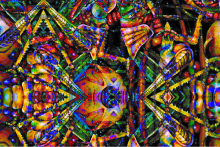attention

Whatever multitasking, social media doomscroll, or email hell you’ve got yourself in right now, I want you to slow down, take a deep breath, and give your full attention to this interview.

In the metaverse, you don’t just curate your surroundings — you also curate your own avatar. One of Zuckerberg’s poker pals, for instance, arrived at the virtual party as a robot wearing a baseball cap.

I am no stranger to the ways that sports is often derided in faith and justice circles. But I contend that sports and competition offer valuable insights into what it means to be human.

For Augustine and his followers, attention was a rare and valuable experience, perhaps even more than for us since they associated it with the divine. One might expect that as a result they should have simply dismissed distraction. But they didn’t.

AS A NATIVE KOREAN who has studied and taught in the U.S. for more than 13 years, I feel like I’m always swinging between two lands—neither giving me a sense of home. Nostalgia might be too gentle a word to describe this in-between space. Rather, it’s a bitter and unpleasant reality constantly reminding me that to some I appear “strange,” “irregular,” “awkward,” “unskillful,” or “suspicious.” In this situation, I remain “unnatural.”
I often feel the same way in the church. My ethnicity and gender are considered marks of “otherness”—even in my own denomination. Every waking moment I wrestle with this question: How can I incorporate my body, my culture, my language as a Korean woman theologian fully into the body of Christ? This wrestling, while uncomfortable, also prevents me from settling with easy or convenient answers. Perpetual dislocation leads me to pay attention to the unseen and unheard corners of the world. It demands I examine old convictions and construct a creative space for new ways of thinking about God, life, and the nature of justice and hope.
The majority of our biblical stories come from people who were also living outside their own land. They too were in some way dislocated. The biblical texts this month call particular attention to their emotions, tensions, and challenges. They invite all of us to feel lost with them, to tremble with them, and to be courageous with them.

I tend toward the “eat, drink, and be merry” life philosophy, popularized by the Bible, and also Dave Matthews Band. Growing up in a very large, very loud, very food-centric family in South Texas ingrained this in me, as we gathered many a Sunday around the table(s) to celebrate that month’s birthdays and talk politics, family businesses, and, mostly, the last Seinfeld episode. What you might call gluttony, I call Sabbath — and I’ll quote Scripture at you to prove my point.
So smug was I at my “breaking bread as Jesus did” epicurean lifestyle that I probably should be writing about pride instead. But a few weekends ago, while finishing up season two of House of Cards three days after it released — and also a bottle of Zinfandel — and taking eye-attention breaks to check my Facebook and Instagram feeds (that adorable photo of baby girl only garnered 64 likes?!), and to see how many steps my Fitbit recorded for the day (so much for that post-dinner Skinny Cow), I paused to reflect upon the concept of gluttony.
When does our reliance upon a constant stream of multi-channel entertainment and instant gratification become harmful?

Recently I’ve been re-reading Susan Cain’s excellent book, Quiet: the Power of Introverts in a World that Can’t Stop Talking. Extroverts will want to take it with a grain of salt (although some of the book’s speculations suggest that extroverts are fairly thick-skinned about being taken down off their pedestals), but the book is a fascinating exploration of what it’s like to be an introvert in the world, including some analysis about how one gets to be an introvert, anyway, including how much is genetic, and how much comes from early environment.
It was in reading one of these “nature or nurture?” passages that I first encountered the “orchid hypothesis.” Taking its name from David Dobbs’ 2009 article, “The Science of Success,” published in The Atlantic, the orchid hypothesis essentially argues, as Cain puts it, that:
“… many children are like dandelions, able to thrive in just about any environment. But others, including the high-reactive types that [developmental psychologist Jerome Kagan] studied, are more like orchids: they wilt easily, but under the right conditions can grow strong and magnificent.” (Quiet, 111)
This jumped off the page at me.